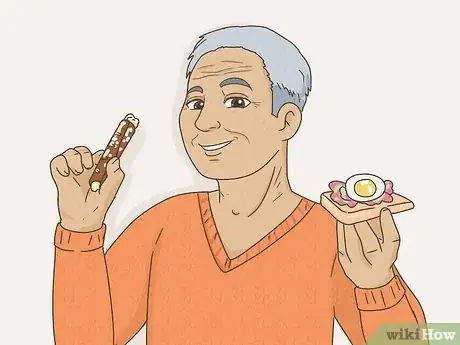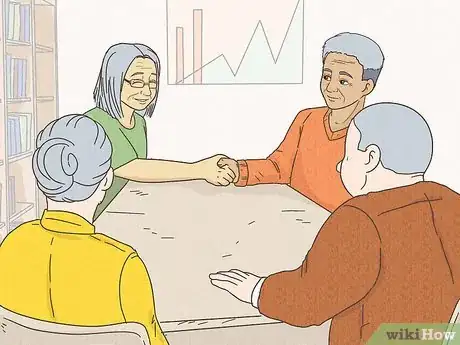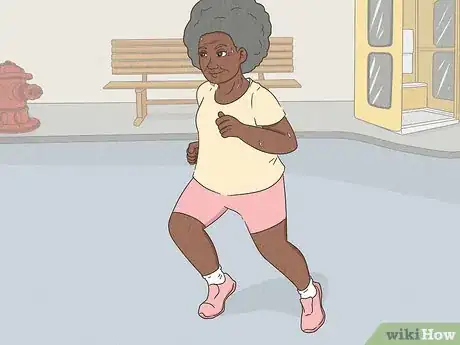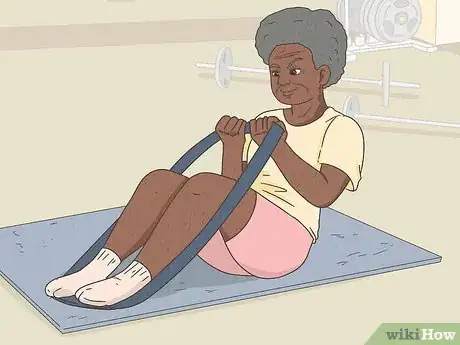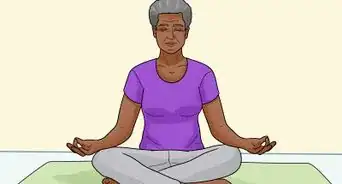This article was co-authored by Vernita Marsh, PhD. Dr. Vernita Marsh is a Licensed Clinical Psychologist and the CEO and Founder of Dr. Vernita Marsh & Associates and The Marsh Clinics®. With over 30 years of clinical psychology experience, she specializes in relationship therapy, grief counseling, family therapy, and intimate partner abuse counseling. Dr. Marsh offers consultation for therapists, coaches, and trainees of mental health. Dr. Marsh earned her PhD in Clinical Psychology from Michigan State University and completed both her postdoctoral and fellowship training at Harvard Medical School. She also has expertise in the area of Telehealth and has received Clinical Telehealth Health Provider Certification from Evergreen.
There are 20 references cited in this article, which can be found at the bottom of the page.
wikiHow marks an article as reader-approved once it receives enough positive feedback. In this case, 83% of readers who voted found the article helpful, earning it our reader-approved status.
This article has been viewed 174,120 times.
As people live longer, conceptions of age and aging are changing throughout the world.[1] In fact, the old truism about fifty being middle-aged no longer holds true and “fifty is the new forty.”[2] But you may not be sure how to embrace life after 50. By exploring the world around you and maintaining your health, you can enjoy just how nifty life after 50 is.
Steps
Engaging in the World
-
1Nurture your curiosities. If you are over 50, chances are that you have older children, may be retired, and may find yourself have more free time. Allow yourself to explore the world around you with activities you might enjoy such as travel, trying different foods, or taking classes.[3]
- Make a list of things that interest you and that you can try out as you have time and money. For example, maybe you wanted to get your pilot's license. Learn as much as you can about it and then pursue flying if you like. Similarly, maybe you always wanted to visit Germany. Start your “travels” at home with books and travel sites about Germany and plan a trip or an extended stay.[4]
- Embracing your curiosity may be easier at your age, as you may have fewer time constraints and responsibilities than you did when you were younger. Being over 50 often gives you the benefit of being able to focus on your own needs and goals. Exploring your curiosities can be healthy and enjoyable.[5]
-
2Engage in new and loved activities. A large part of engaging with the world is staying mentally and physically active. This helps you be physically healthier and mentally happier.[6] Try out new activities or invest more time in ones you love.[7] This can add more character to your life and may introduce you to wonderful new experiences—and people.[8]
- Engage in activities and hobbies like painting, dancing, or collecting coins; try a new sport like Pilates or yoga. Anything you do to stay moving and active can help you stay young at heart.[9] For example, maybe you love medieval art. You could learn how to illuminate manuscripts.
- Be open-minded when you try new activities, especially if your spouse or a friend asked you to join her. Experiencing the activity through her can give you a new appreciation of it and her.[10]
Advertisement -
3Travel where possible. There is an unimaginable amount to explore in other places, from foreign countries to the next town over. Traveling keeps you moving and your brain engaged, which can keep you young at heart.[11]
- Enjoy any place you can go, even if it's a state away. It can offer you new perspectives on how others age and engage with life after 50.[12]
- Take the road less traveled when you travel. Sticking to popular destinations may not be as stimulating or engaging as seeing a new place. For example, if you go to Germany, visit smaller, less-visited cities or towns like Würzburg or Bad Tölz instead of hitting larger areas like Munich.
-
4Expand your education. Take classes in a subject that interests you or continue your training for your job. Challenging your brain can keep you engaged may keep your brain from aging.[13]
- Attend classes, lectures, seminars, or other continuing education programs to stimulate your brain. Many universities offer courses to “senior associates” or may post courses online.[14]
- Taking classes and continuing education may open up new and exciting experiences for you.
-
5Participate in your community. Taking an active part in your community or local area, such as through a chamber of commerce, can provide you a way to stay engaged in life while helping others.[15] It may also help you meet other over-fifty individuals who want to embrace their age as much as you do.[16]
- Participating in the political process through school boards or local initiatives can not only give you something constructive to do, but your wisdom can also help others.[17]
-
6Volunteer in your local area. Simple acts of kindness and helping other individuals can help keep you engaged while imparting your wisdom and experiences to others.[18] Volunteering may also put your life and ability to engage in it in better perspective, and in turn enjoy your post-50 life.[19]
- You likely have specific business or life skills that you've developed over the years. Share these by teaching or mentoring others. You could reach out to the Small Business Administration (SBA) for excellent opportunities to give back, mentor, or volunteer. You can visit the SBA here: https://www.sba.gov/.
- Volunteer at a local school, hospital, or community center.[20]
- Offer to help friends and family if they need it.
-
7Connect with new people. Many people find that their perspectives and tastes change after 50. Connecting with new people can help you stay engaged in the world, and may introduce you to new and wonderful experiences. It can also provide you with a cherished group of persons who care about you and your well-being.[21] [22]
- There are many different ways to meet new people. You may meet them at community events, while traveling, or just by talking to a random person at the store. Be open to chatting with new people who are over 50—or younger.
- Get together with new contacts and friends as you like. For example, you could set up a weekly coffee date or attend a tai-chi class together.
- Meeting new people and engaging with them or even current acquaintances can be excellent for your mental health.
Maintaining Your Well-Being
-
1Keep a schedule. Give your day some structure by maintaining a schedule. Oftentimes, people start to feel a loss of responsibility if they have too much free time and too few obligations. This can make you feel unproductive and less useful. Instead, fill your schedule with activities that you enjoy or need to do.[23]
-
2See your doctor regularly. As a person ages, she has different needs and can become susceptible to new diseases and conditions including heart disease and Alzheimer's. Getting regular checkups with your doctor or doctors can help nip potential health problems in the bud and keep you well enough to embrace your life after 50.[24]
- Observe your body functions closely and make notes of anything that seems “off”. Report this to you doctor when you see her, noting symptoms, their duration, and what relieves them.[25]
-
3Eat healthy, regular meals. Getting healthy and regular meals is vital to maintaining your health after 50. Nutrient rich whole foods such as fruits, vegetables, and lean proteins can give you the energy to embrace life while minimizing the risk of disease.[26]
- You should get between 1,600 and 2,800 calories a day depending on your gender and how active you are.[27]
- Eat 1-1.5 cups of whole fruits daily. Try raspberries, blueberries, or pineapple. Aim to eat whole fruits and not juices, which will not fill you up as much.[28] Vary your choices to ensure you get a range of nutrients.
- Eat 2.5-3 cups of vegetables daily. Try broccoli, sweet potatoes, or zucchini[29] You should also vary your vegetables to ensure you get a range of nutrients.
- Fruits and vegetables are an excellent source of fiber, which you need more of over 50. Fiber can keep your gastrointestinal system regular and minimize your risk for heart disease, strokes, and diabetes.[30]
- Eat 5-8 ounces of grains daily. At least ½ should be whole grains from sources such as brown rice, whole wheat pasta or bread, oatmeal, or cereal.[31]
- Eat 5-6.5 ounces of protein daily from sources such as beef, pork, poultry, cooked beans, eggs, peanut butter, or nuts and seeds.[32] Protein also helps maintain your muscle.
- Get 2-3 cups of dairy every day from sources such as cheese, yogurt, milk, or even ice cream.[33] Dairy builds and helps maintain strong bones and muscles, which is especially important after 50.[34]
- Limit sodium, sweets, sugary drinks, and red meat, all of which can lead to problems with your health.[35]
-
4Get regular cardiovascular exercise. Regular cardiovascular exercise can promote your overall physical and mental health.[36] [37] Any type of moderate exercise you choose, including walking, will benefit you and may also help you meet new people or try a new activity.
- Try and get at least 150 minutes of moderate activity per week.[38] Break this up into 10 minute session if necessary.[39]
- Consult your doctor before beginning any exercise plan.[40]
- If you are a beginner or prefer a lower impact activity, try walking, yoga, or swimming.[41] You can build up to more vigorous activities such as running if you like.
- Listen to your body when you work out. If you feel faint or unwell, rest until you feel better.
-
5Perform strength-training exercises. Consider doing strength training in addition to cardiovascular exercise.[42] There is evidence is can reverse the process of aging as well as helping to ward off age-related diseases such as osteoporosis by building muscles and bone.[43]
- Consult your doctor and a certified trainer before beginning a strength training program.
- Perform exercises that target your whole body and are specific for your needs as you age. For example, leg strengthening exercises build muscles and bones to support your body.[44]
- Try resistance bands if weights are too heavy.[45]
- Try a yoga or Pilates class, which can also strengthen and stretch your muscles in addition to helping you relax.[46]
-
6Listen to your body. In any activity you do, from traveling to exercising, pay attention to your body and your feelings. This can help you identify any health problems that may arise.
- Rest whenever you want or need it. If you are tired even just don't want to exercise one day, allow yourself to rest, which is an important part of staying healthy and happy.[47]
- Stop anything that causes dizziness, headache, worsening or shortness of breath, chest pain, heart palpitations or uneven and rapid heartbeat.[48]
- Get at least 7-9 hours of sleep per night to help your body and mind stay healthy.
Expert Q&A
-
QuestionCan you find happiness after 50?
 Vernita Marsh, PhDDr. Vernita Marsh is a Licensed Clinical Psychologist and the CEO and Founder of Dr. Vernita Marsh & Associates and The Marsh Clinics®. With over 30 years of clinical psychology experience, she specializes in relationship therapy, grief counseling, family therapy, and intimate partner abuse counseling. Dr. Marsh offers consultation for therapists, coaches, and trainees of mental health. Dr. Marsh earned her PhD in Clinical Psychology from Michigan State University and completed both her postdoctoral and fellowship training at Harvard Medical School. She also has expertise in the area of Telehealth and has received Clinical Telehealth Health Provider Certification from Evergreen.
Vernita Marsh, PhDDr. Vernita Marsh is a Licensed Clinical Psychologist and the CEO and Founder of Dr. Vernita Marsh & Associates and The Marsh Clinics®. With over 30 years of clinical psychology experience, she specializes in relationship therapy, grief counseling, family therapy, and intimate partner abuse counseling. Dr. Marsh offers consultation for therapists, coaches, and trainees of mental health. Dr. Marsh earned her PhD in Clinical Psychology from Michigan State University and completed both her postdoctoral and fellowship training at Harvard Medical School. She also has expertise in the area of Telehealth and has received Clinical Telehealth Health Provider Certification from Evergreen.
Licensed Clinical Psychologist, Consultant, & Speaker Absolutely! It all has to do with how you view aging. Oftentimes, people only think about the bad aspects of aging instead of viewing it as a time when you become wiser, more knowledgeable, more generous, and more purposeful.
Absolutely! It all has to do with how you view aging. Oftentimes, people only think about the bad aspects of aging instead of viewing it as a time when you become wiser, more knowledgeable, more generous, and more purposeful. -
QuestionHow can I feel better at 55?
 Vernita Marsh, PhDDr. Vernita Marsh is a Licensed Clinical Psychologist and the CEO and Founder of Dr. Vernita Marsh & Associates and The Marsh Clinics®. With over 30 years of clinical psychology experience, she specializes in relationship therapy, grief counseling, family therapy, and intimate partner abuse counseling. Dr. Marsh offers consultation for therapists, coaches, and trainees of mental health. Dr. Marsh earned her PhD in Clinical Psychology from Michigan State University and completed both her postdoctoral and fellowship training at Harvard Medical School. She also has expertise in the area of Telehealth and has received Clinical Telehealth Health Provider Certification from Evergreen.
Vernita Marsh, PhDDr. Vernita Marsh is a Licensed Clinical Psychologist and the CEO and Founder of Dr. Vernita Marsh & Associates and The Marsh Clinics®. With over 30 years of clinical psychology experience, she specializes in relationship therapy, grief counseling, family therapy, and intimate partner abuse counseling. Dr. Marsh offers consultation for therapists, coaches, and trainees of mental health. Dr. Marsh earned her PhD in Clinical Psychology from Michigan State University and completed both her postdoctoral and fellowship training at Harvard Medical School. She also has expertise in the area of Telehealth and has received Clinical Telehealth Health Provider Certification from Evergreen.
Licensed Clinical Psychologist, Consultant, & Speaker Practice gratitude! Be very thankful about the various things that you have accomplished. Also, make sure you're taking the time maintain and build new social connections.
Practice gratitude! Be very thankful about the various things that you have accomplished. Also, make sure you're taking the time maintain and build new social connections. -
QuestionI just turned 50. I am still single and am unsuccessful in my career. I have been consistent in trying to change my life over the last 20 years, but I hit a road block. What's next for me?
 Paul Chernyak, LPCPaul Chernyak is a Licensed Professional Counselor in Chicago. He graduated from the American School of Professional Psychology in 2011.
Paul Chernyak, LPCPaul Chernyak is a Licensed Professional Counselor in Chicago. He graduated from the American School of Professional Psychology in 2011.
Licensed Professional Counselor First, try to identify the barriers that are keeping you from enjoying life. Then, work on overcoming those barriers and getting out of your comfort zone. Get motivated and choose goals you care about to work toward. Life is always what you make of it, no matter how old you are!
First, try to identify the barriers that are keeping you from enjoying life. Then, work on overcoming those barriers and getting out of your comfort zone. Get motivated and choose goals you care about to work toward. Life is always what you make of it, no matter how old you are!
References
- ↑ http://www.huffingtonpost.com/2015/04/16/60-is-the-new-middle-age_n_7079006.html
- ↑ http://www.huffingtonpost.com/2015/04/16/60-is-the-new-middle-age_n_7079006.html
- ↑ http://www.aarp.org/entertainment/style-trends/info-10-2013/steps-to-living-best-life-after-50.html
- ↑ http://www.aarp.org/entertainment/style-trends/info-10-2013/steps-to-living-best-life-after-50.html
- ↑ http://www.aarp.org/entertainment/style-trends/info-10-2013/steps-to-living-best-life-after-50.html
- ↑ https://scholarcommons.sc.edu/sph_epidemiology_biostatistics_facpub/380/
- ↑ Vernita Marsh, PhD. Licensed Clinical Psychologist, Consultant, & Speaker. Expert Interview. 7 April 2022.
- ↑ http://www.aarp.org/entertainment/style-trends/info-10-2013/steps-to-living-best-life-after-50.html
- ↑ http://www.aarp.org/entertainment/style-trends/info-10-2013/steps-to-living-best-life-after-50.html
- ↑ http://www.aarp.org/entertainment/style-trends/info-10-2013/steps-to-living-best-life-after-50.html
- ↑ http://www.aarp.org/entertainment/style-trends/info-10-2013/steps-to-living-best-life-after-50.html
- ↑ http://www.aarp.org/entertainment/style-trends/info-10-2013/steps-to-living-best-life-after-50.html
- ↑ http://www.aarp.org/entertainment/style-trends/info-10-2013/steps-to-living-best-life-after-50.html
- ↑ http://www.entrepreneur.com/article/236091
- ↑ Vernita Marsh, PhD. Licensed Clinical Psychologist, Consultant, & Speaker. Expert Interview. 7 April 2022.
- ↑ http://www.aarp.org/entertainment/style-trends/info-10-2013/steps-to-living-best-life-after-50.html
- ↑ http://www.aarp.org/entertainment/style-trends/info-10-2013/steps-to-living-best-life-after-50.html
- ↑ Vernita Marsh, PhD. Licensed Clinical Psychologist, Consultant, & Speaker. Expert Interview. 7 April 2022.
- ↑ http://www.aarp.org/entertainment/style-trends/info-10-2013/steps-to-living-best-life-after-50.html
- ↑ http://www.aarp.org/entertainment/style-trends/info-10-2013/steps-to-living-best-life-after-50.html
- ↑ http://www.aarp.org/entertainment/style-trends/info-10-2013/steps-to-living-best-life-after-50.html
- ↑ Vernita Marsh, PhD. Licensed Clinical Psychologist, Consultant, & Speaker. Expert Interview. 7 April 2022.
- ↑ https://www.psychologytoday.com/us/blog/living-forward/201703/the-mental-wellness-routine-will-change-your-life
- ↑ http://www.mayoclinic.org/healthy-lifestyle/healthy-aging/basics/healthy-aging-over-50/hlv-20049407
- ↑ http://www.mayoclinic.org/healthy-lifestyle/healthy-aging/basics/healthy-aging-over-50/hlv-20049407
- ↑ https://www.nia.nih.gov/health/publication/healthy-eating-after-50#howmuch
- ↑ https://www.nia.nih.gov/health/publication/healthy-eating-after-50#howmuch
- ↑ http://www.choosemyplate.gov/fruit
- ↑ http://www.choosemyplate.gov/vegetables
- ↑ http://familydoctor.org/familydoctor/en/seniors/staying-healthy/good-health-habits-at-age-60-and-beyond.html
- ↑ http://www.choosemyplate.gov/grains
- ↑ http://www.choosemyplate.gov/protein-foods
- ↑ http://www.choosemyplate.gov/dairy
- ↑ http://familydoctor.org/familydoctor/en/seniors/staying-healthy/good-health-habits-at-age-60-and-beyond.html
- ↑ https://www.nia.nih.gov/health/publication/healthy-eating-after-50
- ↑ https://www.nia.nih.gov/health/publication/exercise-physical-activity/introduction
- ↑ Vernita Marsh, PhD. Licensed Clinical Psychologist, Consultant, & Speaker. Expert Interview. 7 April 2022.
- ↑ https://www.nia.nih.gov/health/publication/healthy-eating-after-50
- ↑ https://www.nia.nih.gov/health/publication/healthy-eating-after-50
- ↑ http://orthoinfo.aaos.org/topic.cfm?topic=a00531
- ↑ http://orthoinfo.aaos.org/topic.cfm?topic=a00531
- ↑ http://orthoinfo.aaos.org/topic.cfm?topic=a00531
- ↑ https://www.unm.edu/~lkravitz/Article%20folder/ageresistUNM.html
- ↑ http://orthoinfo.aaos.org/topic.cfm?topic=a00531
- ↑ http://familydoctor.org/familydoctor/en/seniors/staying-healthy/good-health-habits-at-age-60-and-beyond.html
- ↑ http://orthoinfo.aaos.org/topic.cfm?topic=a00531
- ↑ http://orthoinfo.aaos.org/topic.cfm?topic=a00531
- ↑ http://orthoinfo.aaos.org/topic.cfm?topic=a00531
About This Article
To enjoy life after 50, dedicate yourself to trying the things you've always wanted to do but haven't gotten around to yet. For example, you can pick up some new hobbies, like yoga, painting, or hiking, or you can travel to new places and spend time exploring. You can also expand your education by taking classes in subjects that interest you at a local university or enrolling in online classes. Additionally, consider volunteering for a cause you care about or participating in local events, which can help you meet new people and feel more connected to your community. For advice from our Counselor co-author, like how to stay healthy after 50, scroll down!
